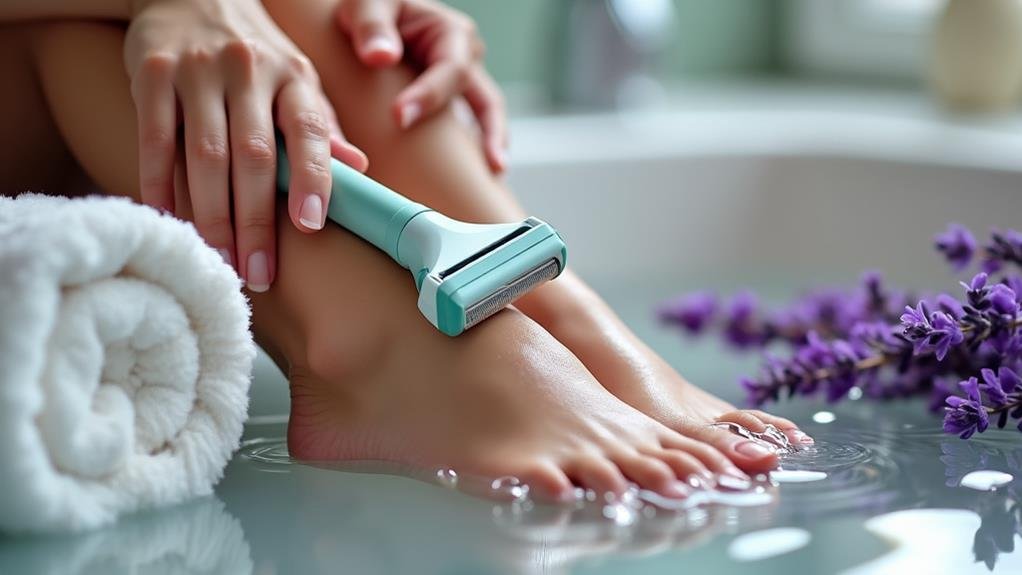
Shaving gently is crucial for sensitive skin because it minimizes trauma and irritation. Your skin has a compromised barrier, making it reactive to harsh products and techniques. Using aggressive methods can lead to redness, razor burn, and inflammation. Gentle shaving reduces nicks and cuts, enhancing hydration and overall comfort. By selecting appropriate tools and products designed specifically for sensitive skin, you can achieve a smoother shave while preserving skin health. Prioritizing gentle techniques not only alleviates immediate discomfort but also supports long-term skin resilience. Learn more about effective strategies and products to ensure your shaving experience is safe and pleasant.
Key Takeaways
- Gentle shaving techniques prevent damage to the skin barrier, reducing irritation and discomfort for sensitive skin.
- Minimizing pressure and using sharp blades lowers the risk of nicks, cuts, and razor burn.
- A smoother shave achieved through gentleness decreases redness and inflammation post-shave.
- Gentle methods enhance hydration, helping to maintain skin moisture and softness after shaving.
- Selecting appropriate products and tools for sensitive skin promotes a more enjoyable and irritation-free shaving experience.
Understanding Sensitive Skin
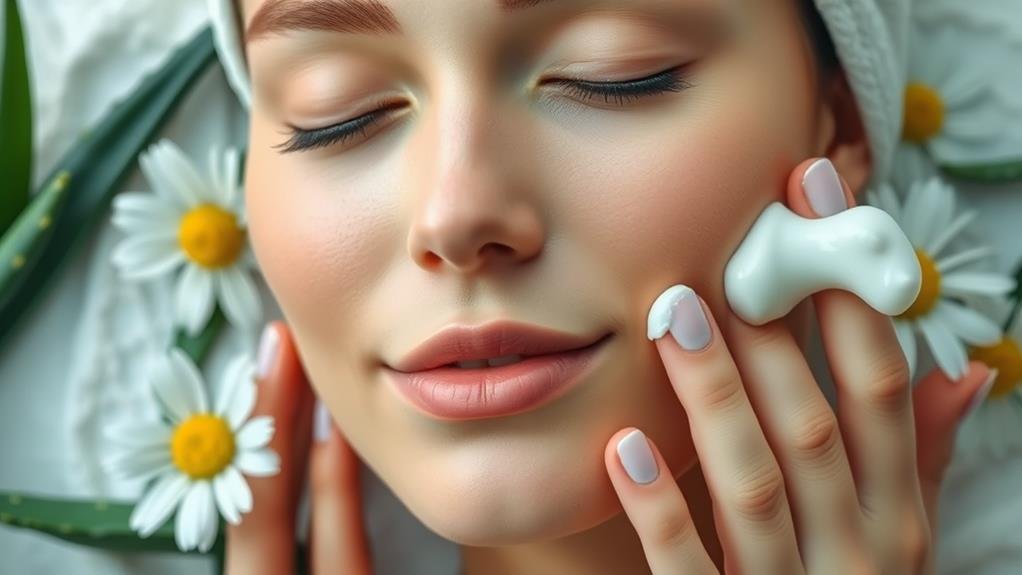
Understanding sensitive skin is crucial for anyone who experiences discomfort during shaving. Sensitive skin is a unique skin type characterized by increased reactivity to various stimuli, including products and environmental factors. Factors contributing to sensitivity can include genetics, environmental exposure, and the use of harsh products.
When you have sensitive skin, your skin's barrier might be compromised, leading to heightened reactions to shaving. Several sensitivity causes can exacerbate your discomfort. For instance, certain ingredients in shaving creams or aftershaves, such as alcohol and fragrances, can irritate your skin.
Additionally, the method of shaving—whether using a razor or electric shaver—can also impact how your skin reacts. Improper technique, like using too much pressure or dull blades, might further aggravate your skin, leading to redness, burning, and discomfort.
Recognizing your specific skin type is essential for tailoring your shaving routine. By identifying sensitivity causes and adjusting your approach, you can minimize irritation and achieve a smoother shave.
Employing gentler products and techniques will empower you to enjoy shaving comfortably, enhancing your overall grooming experience.
Common Symptoms of Irritation
Irritation during shaving can manifest through various symptoms that indicate your skin's sensitivity. Recognizing these signs is crucial for maintaining healthy skin and preventing discomfort. Here are some common symptoms you might experience:
| Symptom | Description |
|---|---|
| Redness Response | Skin may appear flushed and inflamed. |
| Itchiness Sensation | A persistent urge to scratch the area. |
| Razor Burn | A burning feeling on the shaved surface. |
| Dryness Flaking | Skin may become dry and start to peel. |
| Inflammation Flare Up | Swelling and puffiness around the area. |
| Bump Formation | Small, red bumps may develop post-shave. |
| Swelling Discomfort | Tenderness or pain can occur in sensitive areas. |
| Sensitivity Triggers | Certain products can exacerbate irritation. |
These symptoms, including razor burn and dryness flaking, often signal that your skin is reacting to sensitivity triggers. When you encounter signs of inflammation flare up or swelling discomfort, it's essential to assess your shaving routine. By being aware of these symptoms, you can take proactive steps to protect your skin.
Impact of Harsh Shaving
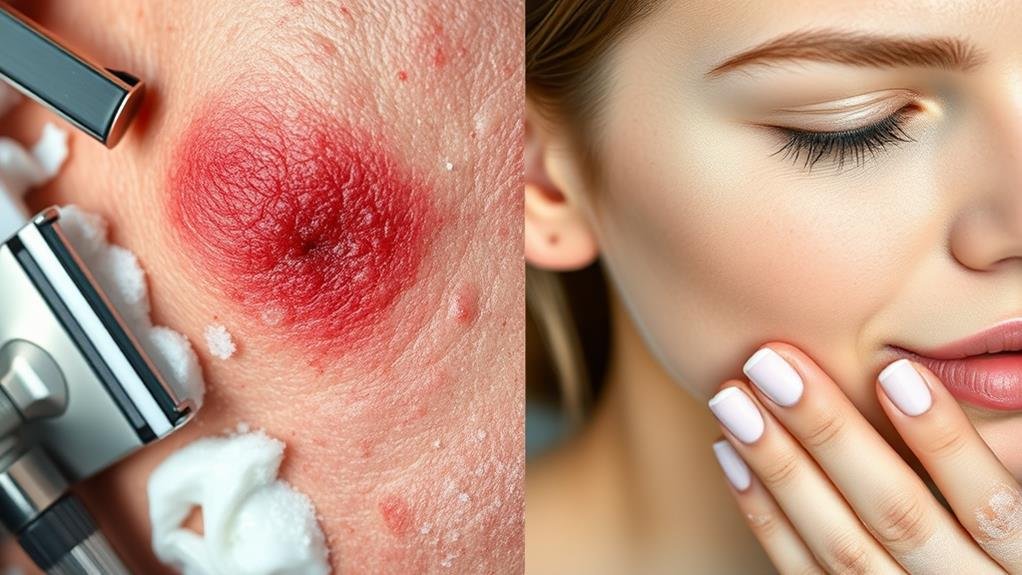
Harsh shaving techniques can significantly impact your skin's health, leading to increased discomfort and irritation. When you use aggressive methods, you risk damaging the skin barrier, which is crucial for maintaining hydration and protection against irritants. This damage can manifest as redness, swelling, and an overall feeling of rawness.
Different skin types react variably to such techniques. For instance, sensitive skin is particularly vulnerable, responding poorly to rough blades and excessive pressure. These harsh methods can exacerbate pre-existing conditions like eczema or rosacea, causing flare-ups that not only hinder your daily routine but also affect your confidence.
Moreover, frequent use of harsh shaving techniques may lead to long-term skin problems, such as hyperpigmentation or scarring. You might find yourself trapped in a cycle of irritation that requires extensive care to rectify.
Understanding your skin type is essential; it allows you to choose appropriate products and methods that minimize damage. Ultimately, adopting gentler techniques can foster healthier skin, reduce discomfort, and enhance your overall shaving experience, allowing you the freedom to enjoy smooth skin without the aftermath of irritation.
Benefits of Gentle Techniques
Gentle shaving techniques offer numerous benefits for those with sensitive skin, significantly improving the overall experience and outcomes. By adopting these methods, you can minimize irritation, reduce razor burn, and achieve a smoother finish without compromising skin integrity. Gentle exfoliation techniques prepare your skin effectively, removing dead skin cells and allowing for a closer shave while maintaining comfort.
Here's a concise overview of the benefits:
| Benefit | Description |
|---|---|
| Reduced Irritation | Minimizes redness and discomfort. |
| Smoother Shave | Achieves a closer shave with fewer nicks. |
| Enhanced Hydration | Retains skin moisture for softness. |
| Post-Shave Calm | Integrates calming post-shave routines that soothe the skin. |
Incorporating gentle techniques not only enhances your shaving experience but also allows for the application of soothing products afterward. These calming post-shave routines can further alleviate any potential irritation, ensuring your skin remains healthy and comfortable. By prioritizing gentleness, you empower yourself to enjoy the freedom of shaving without the fear of discomfort.
Choosing the Right Products
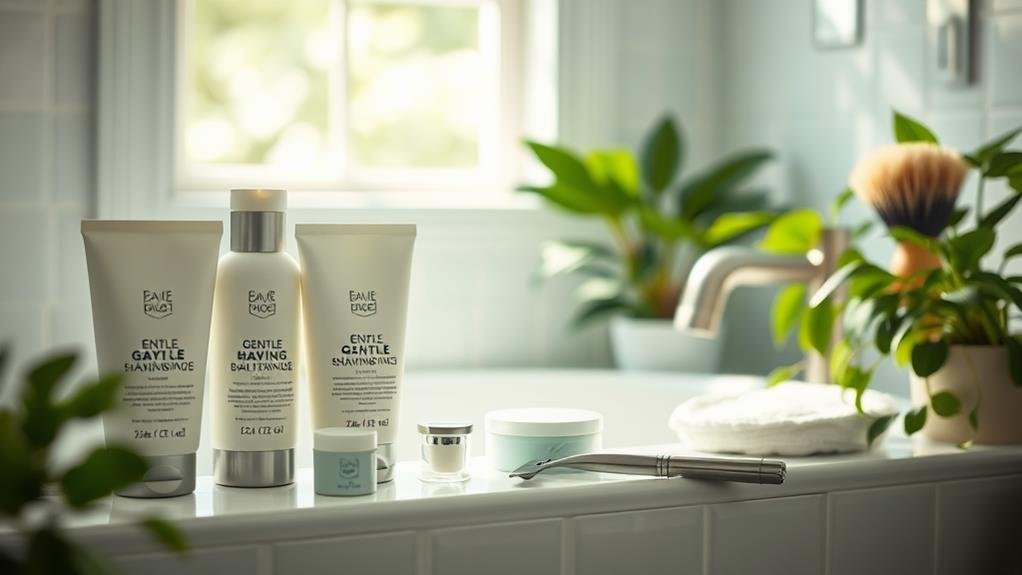
Selecting the right products is crucial for achieving a comfortable shaving experience, especially for those with sensitive skin. You should prioritize products that feature natural ingredients, as they tend to minimize irritation and promote skin compatibility.
Look for hypoallergenic products that have been specifically formulated to reduce the risk of allergic reactions and inflammation. Opting for fragrance-free options is essential, as synthetic fragrances can exacerbate sensitivity.
Moisturizing formulas can provide an additional layer of comfort by hydrating your skin and maintaining its pH balance. This helps to prevent dryness and irritation during and after shaving.
Consider dermatologist recommendations when selecting your products; they often endorse brands that prioritize sensitive skin. Additionally, explore eco-friendly options that not only benefit your skin but also support environmental sustainability.
These products typically avoid harsh chemicals, making them gentler on your skin.
Preparing Your Skin for Shaving
Before you begin shaving, it's essential to prepare your skin properly to minimize discomfort and irritation. Start by using effective exfoliating techniques to remove dead skin cells. This step clears away debris and helps prevent ingrown hairs, ensuring a smoother shave. You can use a gentle scrub or a chemical exfoliant that suits your skin type.
Once exfoliated, it's crucial to follow up with a solid moisturizing routine. Hydration plays a vital role in preparing sensitive skin for shaving. Apply a quality moisturizer to create a protective barrier, which reduces friction during the shave. Ideally, you should moisturize both before and after shaving to maintain skin hydration and support its natural barrier.
Additionally, consider using warm water to soften the hair and open up your pores, making the shaving process easier and less irritating. Avoid hot water, as it can strip essential oils from your skin, leading to dryness.
Best Shaving Tools for Sensitivity
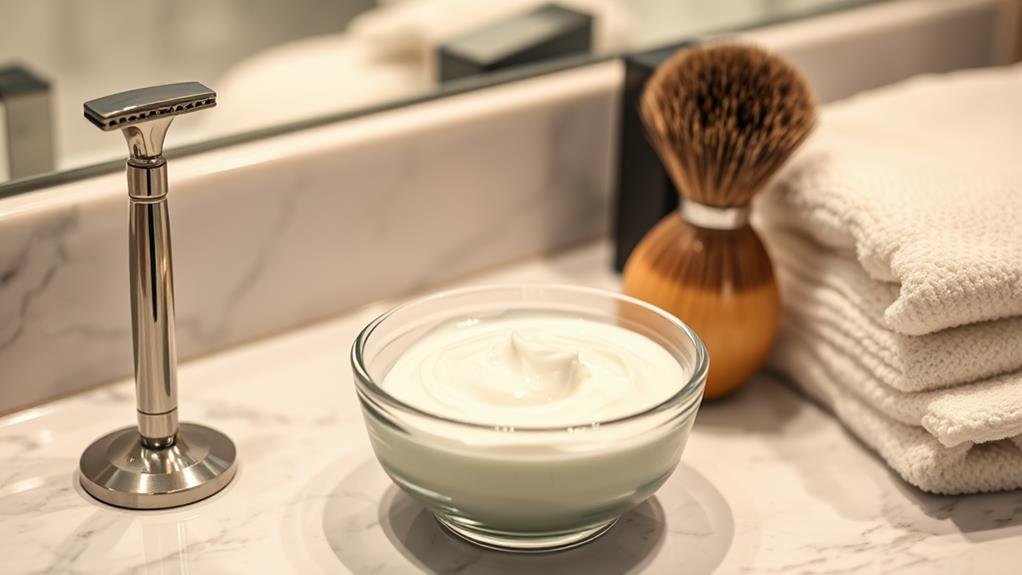
Finding the right shaving tools is crucial for those with sensitive skin, as the wrong equipment can lead to irritation and discomfort.
Choosing tools specifically designed for sensitivity can make a significant difference in your shaving experience. Here are some essential shaving tools to consider:
- Safety Razor: Offers a close shave with less irritation, reducing the chances of nicks and cuts.
- Single-Blade Razor: Minimizes the tugging and pulling on hair, providing a gentler shave.
- Shaving Cream for Sensitive Skin: Formulated to soothe and protect, enhancing glide and reducing friction.
- Post-Shave Balm: A calming product that helps to soothe the skin after shaving, preventing irritation.
- Quality Shaving Brush: A soft brush can help apply shaving cream evenly, ensuring a smoother shave.
Post-Shave Care Essentials
After shaving, it's crucial to prioritize post-shave care to maintain your skin's health.
Hydrating your skin and incorporating soothing ingredients can significantly reduce irritation.
Additionally, being mindful of potential irritation triggers helps ensure a smoother recovery for sensitive skin.
Hydration After Shaving
Post-shaving, your skin can feel vulnerable and in need of immediate hydration to restore its balance. Hydration factors, such as moisture retention and barrier repair, are crucial for maintaining skin health.
Implementing effective moisturizing techniques can significantly improve your post-shave experience. Here are some essential steps to follow:
- Use a gentle, alcohol-free aftershave: This avoids further irritation while providing hydration.
- Apply a lightweight moisturizer: Look for products containing hyaluronic acid or glycerin, which attract moisture to the skin.
- Consider a facial oil: Oils can seal in moisture and provide additional nourishment to sensitive skin.
- Incorporate a hydrating serum: Serums with antioxidants can enhance hydration and protect against environmental stressors.
- Drink plenty of water: Staying hydrated internally supports skin elasticity and resilience.
Soothing Ingredients to Use
To effectively soothe your skin after shaving, incorporating specific ingredients can make a significant difference in your recovery process. Start by looking for soothing oils, such as jojoba or coconut oil. These oils not only hydrate your skin but also create a protective barrier that helps prevent moisture loss. Their anti-inflammatory properties can alleviate any irritation you may experience post-shave.
Additionally, consider products with calming extracts like chamomile or aloe vera. Chamomile is known for its ability to reduce redness and soothe discomfort, while aloe vera provides cooling relief and promotes healing. Both extracts are gentle, making them perfect for sensitive skin types.
When selecting post-shave products, prioritize those that are free from artificial fragrances and harsh chemicals, as these can exacerbate irritation. Instead, opt for formulations that highlight their soothing and calming properties.
Avoiding Irritation Triggers
Irritation can easily arise from common post-shave habits, so it's crucial to identify and avoid triggers that exacerbate sensitivity.
After shaving, your skin is particularly vulnerable, making it essential to adopt practices that minimize irritation. Here are some key strategies to help you maintain healthy skin:
- Avoid harsh products: Skip alcohol-based aftershaves and fragrances that can irritate sensitive skin.
- Opt for gentle cleansers: Use mild, non-irritating soaps or cleansers to prevent skin sensitivity.
- Hydrate properly: Apply a soothing moisturizer or aftershave balm to lock in moisture and calm irritation.
- Refrain from exfoliating: Delay any exfoliation for a few days post-shave to avoid further irritation triggers.
- Limit sun exposure: Protect your skin from UV rays, as it can be more sensitive after shaving.
Techniques to Minimize Irritation
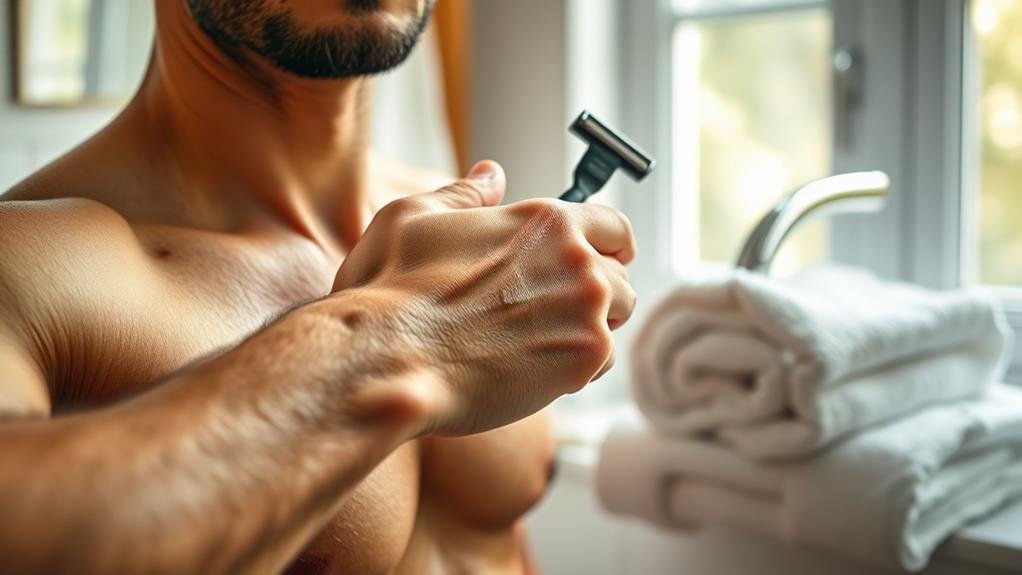
When shaving, employing specific techniques can significantly reduce irritation for those with sensitive skin. Start by keeping your shaving pressure light; pressing too hard can lead to nicks and increased redness. Instead, let the blade do the work.
Next, pay close attention to the blade angle. A 30-degree angle is generally optimal, allowing the razor to glide smoothly over your skin while minimizing tugging. This angle helps prevent hair from being pulled rather than cut, which can lead to discomfort.
Additionally, always use a sharp blade. Dull blades require more pressure and can cause irritation. Replace your blade regularly to ensure a clean, efficient shave.
Prepping your skin is equally important. Use a quality shaving cream or gel that hydrates and protects your skin, creating a barrier between the razor and your face.
Shaving in the direction of hair growth can also help reduce irritation, as it minimizes the risk of ingrown hairs.
Long-Term Skin Health Considerations
To ensure long-term skin health, it's crucial to focus on preventing irritation and inflammation during shaving.
Maintaining your skin barrier function will help protect against external aggressors and promote overall skin resilience.
Preventing Irritation and Inflammation
Reducing irritation and inflammation during shaving is crucial for maintaining long-term skin health, especially for those with sensitive skin.
By adopting a gentle shaving routine, you can minimize adverse reactions that lead to discomfort and skin damage.
Here are some effective strategies to help prevent irritation and inflammation:
- Choose the Right Razor: Opt for a sharp, clean razor that's suitable for your skin type to reduce tugging.
- Adjust Shaving Frequency: Tailor your shaving frequency based on your skin's response; less frequent shaving may help sensitive skin recover.
- Use Soothing Products: Incorporate pre-shave oils and post-shave balms that contain calming ingredients, like aloe vera or chamomile.
- Hydrate Your Skin: Always hydrate your skin before shaving; warm water softens hair and opens pores, making shaving smoother.
- Pay Attention to Technique: Use light, gentle strokes in the direction of hair growth to minimize irritation.
Maintaining Skin Barrier Function
Irritation and inflammation can compromise your skin's barrier function, leading to a host of long-term skin issues. When your skin barrier is weakened, it can't effectively retain moisture, which is crucial for maintaining healthy skin.
This moisture retention is vital, as it helps prevent dryness, irritation, and premature aging.
To promote barrier repair, you should choose gentle shaving products and techniques that minimize trauma to the skin. Look for creams and gels that contain hydrating ingredients, like hyaluronic acid or glycerin, which enhance moisture levels while providing a protective layer.
After shaving, applying a soothing moisturizer can further support your skin's barrier function, ensuring it stays hydrated and resilient.
Incorporating barrier-repairing ingredients, such as ceramides and fatty acids, into your skincare routine can also be beneficial. These components work synergistically to restore the skin's natural lipid barrier, enhancing overall skin health.
Promoting Overall Skin Resilience
While many focus on immediate relief during shaving, promoting overall skin resilience is essential for long-term health.
By incorporating skin resilience strategies into your grooming routine, you can enhance your skin's ability to withstand irritation and environmental stressors.
To achieve this, consider the following gentle grooming techniques:
- Use a sharp, clean razor: Dull blades can cause unnecessary irritation, so replace them regularly.
- Apply a pre-shave oil: This can hydrate and prepare your skin, reducing friction during shaving.
- Opt for alcohol-free shaving creams: These products reduce the risk of drying out your skin and maintain its natural moisture.
- Incorporate soothing aftercare: Use products with ingredients like aloe vera or chamomile to calm and nourish your skin post-shave.
- Stay hydrated: Drinking plenty of water supports your skin's elasticity and overall health.
Conclusion
In conclusion, treating sensitive skin with gentle shaving techniques is like nurturing a delicate flower; it requires care and precision to thrive. By understanding your skin's unique needs and choosing the right products and tools, you can significantly reduce irritation and promote long-term health. Remember, the goal is to create a soothing ritual that not only protects your skin but also enhances your overall comfort. Prioritize gentleness, and your skin will thank you with a radiant glow.
